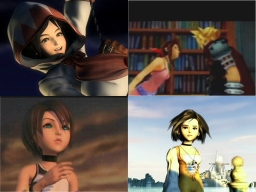
Originally Posted by
Tavrobel
Have you people completely forgotten that .999... is an approximation?
Intergers, radicals, and fractions are exact values.
.999... vs. 1 is comparing an infinte concept (an approximation, at that) to an exact value. That is like asking someone to divide by 0.
Ok, so 1/3 == .333..., but .333... is still a approximation. You cannot have an exact value for 1/3 in decimal notation because it does not end. So stop saying that 1/9 * 9 == .999... == 1 or 1/3 * 3 == .999... == 1 is true. 1/7 * 7 is also an infinite set of numbers, yes, even though it does not equal .999..., but rather, a smaller number, it still would equal one.
Any number divided by itself is 1 (except 0/0). This the FIRST grand assumption that people miss/omit.
However, the "pick out a number between the two and you define them as different numbers", that one, I couldn't attack even if I were smart enough to explain it.






 Reply With Quote
Reply With Quote






 It's so...........hypnotic:kaodizzy:
It's so...........hypnotic:kaodizzy:
